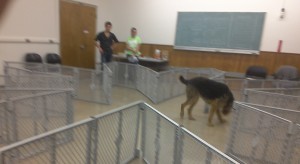
Thought you might be interested in Migs’ latest contribution to science.
Research is being conducted by the Canine Science Collaboratory at ASU with the goal of establishing a behavioral test that can be used to understand the development of human Alzheimer’s disease. They’ve already determined that the symptoms are alike.
The test itself was very straight forward. A maze with six arms is set up, with food in each arm, and the dog, under differing conditions, is supposed to go to each arm and find the food reward. There are two “training” runs where I go in with her and lead her to the reward in each arm. Then she goes again by herself and finds the food on the floor. The next 3 runs, the food is placed in a dish anchored to the gate and the dog goes thru again to find the food in the dishes. At the start of each run the dog starts the run at a different entry point. On this set, the owner has to sit quietly and do the Milan thing – No touch, No talk, No eye contact. That was hard. Migs found all the food on the first runs. On the last 3 she left one un-found. She’d go back to ones she checked before a couple of time and then she went to the middle of ring and I could see her (from the corner of my eye that wasn’t looking at her) glancing all around – at me, at the testers and then she just laid down and stayed there.
All the obedience work which taught her to look to me for clues and no clues were coming! Poor girl.
They are looking for as many breeds and ages as they can get and then they’ll start developing correlations if they’re there. Anyway, Migs had lots of new people to pet her and she did get a bagful of treats so was a good deal for her.
Here’s the verbatim paragraph on the research:
“Currently, despite the amazing similarity in Alzheimer’s like symptoms that can emerge in dogs,there is no behavioral test that can predict dogs with human Alzheimer’s-like symptoms. Once a behavioral test can be established, the same kind of research being employed by canine geneticists which has offered massive insights into our understanding of human cancer can be used to understand the development of human Alzheimer’s disease.”
If anyone else in the Phoenix area wants to participate, the study coordinator can be reached @ ASUdram@gmail.com. They said feel free to publish it. The test is held on the main campus at ASU.

You must be logged in to post a comment.